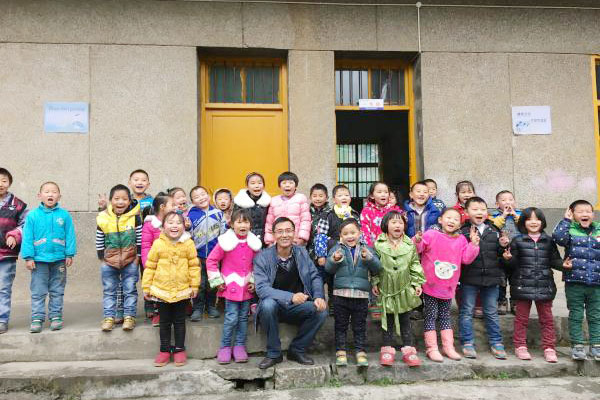 |
|
Ge Yike, one of the initiators for the charity project"One School One Dream", with pupils of Shima primary school in Badong county, Central China's Hubei province, Oct 2015. [Photo provided to chinadaily.com.cn] |
Lawmakers are debating new legislation to encourage the development of the charitable sector and repair a tarnished image, as Luo Wangshu and Cao Yin report.
On March 4, the day before the start of the annual session of China's legislature, a reporter asked the country's top legislators why they planned to review the final draft of a new charity law in preference to "more important" legislation.
Given the weighty subjects under discussion at the annual gathering, the question was appropriate, but it also revealed the mainstream Chinese view of philanthropy: For many people, charity is irrelevant to their lives.
However, the draft of a new law that was submitted for review on Wednesday aims to regulate and develop the sector, and is expected to provide a vital shot in the arm for charities.
"What has impressed me most is that the draft aims to create a more supportive environment for charitable activities. It will simplify the registration procedures and allow people, resources and organizations with the desire to undertake charitable acts to enter the field," said Li Jing, secretary-general of the One Foundation, China's first private charitable fundraiser.
"Meanwhile, supervision will be strengthened to regulate and manage social organizations to prevent illegality," he said, adding that the new law will promote competition in the sector.
Wang Ming, president of the NGO Research Institute at Tsinghua University and also a member of the National Committee of the Chinese People's Political Consultative Conference, called the proposed legislation a "milestone" in Chinese philanthropy.
"In the past decade, the boom in philanthropy has mostly been driven by the market, but it has also been driven by society as a whole, including private companies, enterprises and public enthusiasm. But without laws or regulations, problems may arise," he said.
China has more than 600,000 social organizations and 65 million registered volunteers. In 2014, direct donations totaled more than 100 billion yuan ($15 billion), overshadowing the 10 billion yuan donated in 2004.
In response, the government is aiming to standardize the sector. In October, the first draft of the new law was submitted to the National People's Congress, the nation's top legislative body, and the second draft was open for public consultation until Jan 31. NPC deputies will vote on the final draft on March 16, the last day of this year's two sessions.
"The importance of the charity law cannot be underestimated," said Fu Ying, spokeswoman for the Fourth Session of the 12th National People's Congress, adding that it will be the country's first fundamental and comprehensive law on philanthropy.
With the fast development of philanthropy, China urgently needs a comprehensive charity law that will protect the rights of donors and the needy, and punish fraudulent operators, she said.